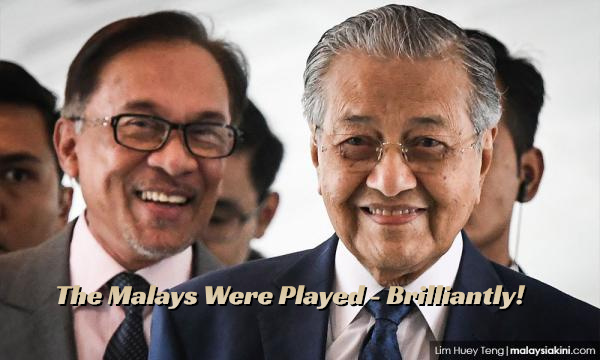Mahathir & Anwar - The Race & Religion Gambit - And Most Malays Still Don’t Realize It
By Damian Ferrnandez Malaysia’s Race & Religion Playbook – Part 2

BTN, Bumiputera and Billionaires: The Greatest Political Con Job in Malaysian History.
Half a century of ‘Malay rights,’ and somehow the non-Malay tycoons still became richer than everyone else.
How Malaysia’s ‘unity’ was engineered with racism, religion and a smile, for political profit.
For decades, Malaysians were told a simple story: the Malays needed protection, and the only patriotic response was to support policies that favored them. Anyone who questioned this sacred doctrine was anti-Malay, anti-Islam, anti-national interest — pick your slur of the season. Yet behind this narrative lay one of the greatest political sham in modern Southeast Asian history: the Malays were not being protected. They were being played.
And they were played brilliantly.
Mahathir and Anwar — two men who despised each other publicly but operated from the same playbook — understood one crucial thing: if you can convince a community that they are under constant threat, they will hand you unlimited power in exchange for “protection.” You don’t need results, you don’t need performance — all you need to do is keep them afraid and grateful.
It worked like a charm.
The Bumiputra Mirage: A Luxury Yacht for a Few, a Lifeboat for Many.
The original selling point was seductive: special rights for Malays. It sounded like instant prizes — jobs, contracts, education quotas, business licenses, everything. Like a national lucky draw where only one race had a ticket.
Except most Malays never won anything.
What they got were crumbs — a selective scholarship, an occasional promotion, maybe a 10% discount on a house they still couldn’t afford. Meanwhile, a tiny elite was dining on the full buffet: billions in contracts, monopoly licenses, land deals, and later, corporate takeovers disguised as “national interest.”
The result?
A handful of Malay billionaires who now lecture everyone about “merit.”
A middle class barely holding on.
And a vast working class still waiting for prosperity that was promised in 1971, 1981, 1991, 2001, and will apparently arrive “soon” if they just vote correctly one more time.
You know what they call this in Genting? A rigged slot machine. The lights flash, it looks exciting, you think your turn is coming — but the jackpot already went to someone who owns the casino.
The Great Diversion: When Billionaires Become “Proof” of Malay Success.
Look carefully at the list of people who truly got rich under 40 years of Malay-first policies. You will find:
Robert Kuok – (sugar, palm oil, shipping, hotels). Still Malaysia’s richest man.
Vincent Tan – (Berjaya Group tycoon, from lotteries to resorts to McDonald’s).
Lim Goh Tong (casino tycoon)
Yeoh Tiong Lay (construction and utilities)
Ananda Krishnan (telecoms and media)
Tan Sri Arumugam (various industrial interests)
Plus, of course, Mahathir’s children, who somehow emerged from politics as one of the richest families in Asia — a truly remarkable feat for a career civil servant family.
So yes, Malaysia did produce billionaires. But most of them were not Malay.
The Malays got the political speeches. The cronies got the wealth.
And the non-Malay tycoons got the contracts — as long as they played the game.
This was not affirmative action. It was a political business model.
While the Malays Were Told to Fear the Chinese, the Chinese Were Signing Contracts in Perdana Putra.
One of the saddest ironies is this:
While the average Malay was being warned daily that “the Chinese control everything,” Mahathir and Anwar were cutting billion-ringgit deals with Chinese businessmen — not China, but Malaysian Chinese tycoons.
Public narrative:
“We must protect Malays from Chinese economic domination”
Private reality:
“Sure, you can have the telecom licence — but my children will quietly hold 30% through offshore nominees, and you’ll award the downstream contracts to my selected Malay cronies. Everyone gets rich, the public stays patriotic. Deal?”
If Malays truly understood how many government contracts went to non-Malay billionaires with political blessing, Putrajaya would need riot insurance.
The BTN — How to Manufacture Loyal Citizens (and Racists) in 5 Days.
Now let’s talk about BTN — Biro Tata Negara.
Official description: A government programme designed to build patriotism and leadership among Malaysians.
Unofficial description: A secret training camp to teach you how to love your country — and side-eye your non-Malay neighbour.
Originally set up in 1974 as something totally harmless sounding — the “Youth Research Unit” — BTN got a promotion in 1981 and was moved under the Prime Minister’s Department. That was the upgrade patch that turned it into a full-blown political indoctrination factory.
BTN’s mission looked harmless on paper:
“To nurture the spirit of patriotism and commitment to excellence among Malaysians.”
Beautiful.
If you didn’t read the fine print: “Patriotism,” here, means believing:
Malays are under threat,
Islam is under siege,
and only Barisan Nasional can save the nation from… well, everyone else.
BTN camps became infamous for their “motivational lectures,” where civil servants were told:
Non-Malays are pendatang (immigrants).
The Malays must unite to defend their dominance.
Criticising the government is basically treason.
And liberalism, pluralism and independent thinking are… dangerous foreign diseases, like dengue but for the brain.
All this while singing patriotic songs and doing light aerobics.
So what was Anwar doing in all of this?
Ah, yes. Our friend Anwar Ibrahim.
When people complain that BTN became a breeding ground for Islamisation, anti-non-Malay sentiment and BN propaganda, there are sources that point directly to him. During his rise in government, Anwar was said to have used BTN to shape the worldview of young Malays and civil servants — pushing a Malay-Muslim political consciousness wrapped in religious language.
In simpler English:
“Come to BTN camp, we will teach you patriotism. Step 1: the Chinese want to take your rights. Step 2: only our ‘Islamic leadership’ can protect you. Step 3: vote accordingly.”
Did Anwar ever openly admit this? Of course not. But the BTN slide decks leaked later didn’t exactly say “We love multiculturalism”. They said things like:
“The non-Malays are demanding too much.”
“Malay political power is weakening.”
“This is dangerous.”
…and that’s just the polite summary.
What about Mahathir? Was he a supporter?
Oh, Mahathir loved BTN. The BTN was perfectly aligned with his worldview:
“Malaysia is multicultural — but let’s not get carried away.”
Mahathir defended BTN many times, arguing it taught discipline and national values.
Yes. Much like a strict boarding school teaches discipline, except this one also teaches you who to blame for everything wrong in the country. Under Mahathir, BTN was never dismantled. Never scaled back. Never reformed. It grew stronger every election cycle, quietly shaping the minds of civil servants and student leaders. In other words:
Mahathir built the hardware.
Anwar installed the religious software.
BTN became the operating system.
Why does this matter?
Because when you wonder:
“Why do some Malays think they will lose everything if non-Malays get equal rights?”
BTN is part of the answer. When civil servants view non-Malays with suspicion — BTN helped write that script. When Malaysia has institutional racism built into daily decision-making — BTN graduates helped administer it.
It was not just a camp. It was five decades of ideological conditioning and indoctrination disguised as patriotism.
BTN’s slogan should have been:
“We unite Malaysians — by telling half of them the other half cannot be trusted.”
The Tragedy of Malay Patriotism — Hijacked and Monetised.
Many Malays supported these policies in good faith. They believed:
The government was helping them.
The threats were real.
The political leaders were sincere.
They were told that Chinese and Indian Malaysians were the threat. But the real threat was sitting in Cabinet. While Malays were told to distrust their neighbours, the political elite quietly removed the ladder of opportunity — then blamed everyone else for why Malays were still struggling.
It was the political version of: “I stole your wallet. Now let me protect you from wallet thieves”.
Why It Still Works Today.
You might ask: “After 50 years, why don’t the Malays see it?”
Because the con is elegant.
Keep Malays economically dependent.
Tell them outsiders are trying to take everything away.
Offer protection that never arrives — but looks like it almost might.
Blame others for the lack of progress.
Repeat every election.
This is not politics. It is emotional blackmail to secure power. Today, Malaysia is stuck with:
A shrinking middle class
Rising racial suspicion
Brain drain across all races
An economy being overtaken by neighbours once far behind us.
And yet, every election, the same old message returns: “Vote for us or the Malays will lose everything.”
The great irony? The Malays have already lost — not to the Chinese, not to the Indians — but to the very leaders who claimed to protect them.
